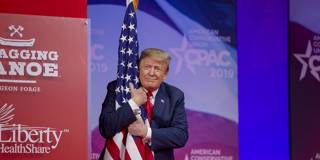Foreign partners' willingness to help the United States is affected not just by America's hard military and economic power, but also by its soft power of attraction, based on an open culture, liberal democratic values, and policies that are perceived as legitimate. US foreign policy can succeed only if Americans relearn this.
CAMBRIDGE – US President Donald Trump’s attacks on unfair Chinese trade and technology policies may have been justified, but his tactics have damaged the alliances and institutions on which the United States depends. Will the short-term gains outweigh the long-term institutional costs?
Trump’s defenders claim that his aggressive unilateral approach broke the inertia in the international trade regime and prevented other countries from diluting US power. But Trump’s transactional diplomacy is very different from the institutional vision of foreign policy that former US Secretary of State George Shultz once described as patient “gardening.”
Ever since World War II, American presidents have tended to support international institutions and sought their extension, whether it be the Nuclear Non-Proliferation Treaty under Lyndon B. Johnson; arms-control agreements under Richard Nixon, Gerald Ford, and Jimmy Carter; the Rio agreement on climate change under George H. W. Bush; the World Trade Organization and the Missile Technology Control Regime under Bill Clinton; or the Paris climate agreement under Barack Obama.

CAMBRIDGE – US President Donald Trump’s attacks on unfair Chinese trade and technology policies may have been justified, but his tactics have damaged the alliances and institutions on which the United States depends. Will the short-term gains outweigh the long-term institutional costs?
Trump’s defenders claim that his aggressive unilateral approach broke the inertia in the international trade regime and prevented other countries from diluting US power. But Trump’s transactional diplomacy is very different from the institutional vision of foreign policy that former US Secretary of State George Shultz once described as patient “gardening.”
Ever since World War II, American presidents have tended to support international institutions and sought their extension, whether it be the Nuclear Non-Proliferation Treaty under Lyndon B. Johnson; arms-control agreements under Richard Nixon, Gerald Ford, and Jimmy Carter; the Rio agreement on climate change under George H. W. Bush; the World Trade Organization and the Missile Technology Control Regime under Bill Clinton; or the Paris climate agreement under Barack Obama.